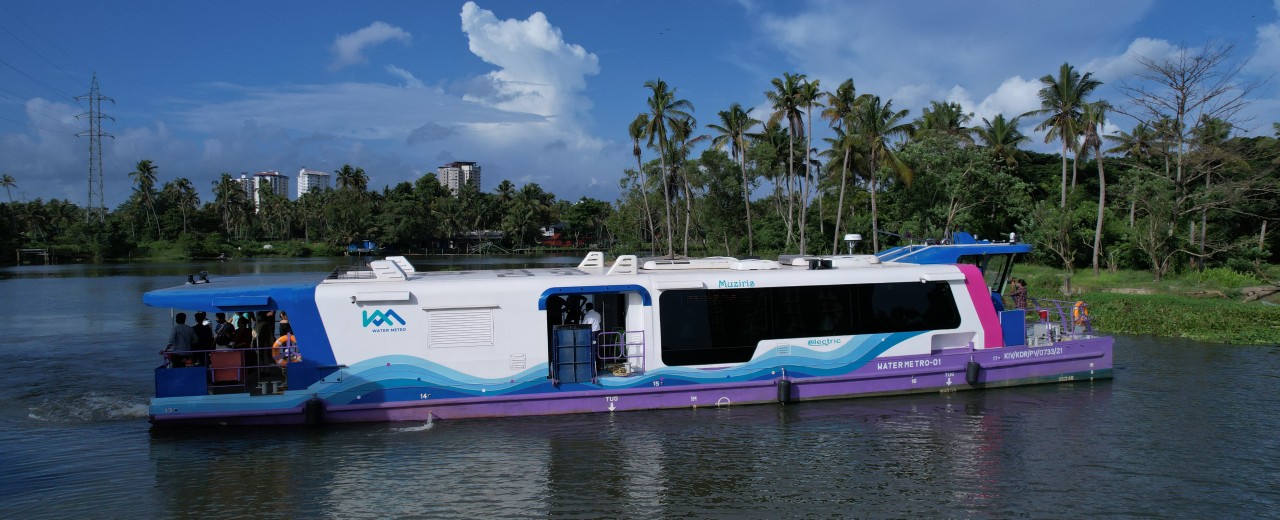
As of: 02/2024
The city of Kochi, which now has more than two million inhabitants, continues to grow. Transport is increasing. Up to now, connection to the coastal islands and peninsulas of the port city in southwestern India has been poor. More and more people were buying motorised private vehicles. But an integrated transport network and the introduction of a large number of new, regular ferry connections should change this. The aim is to make public transport more attractive in the future. KfW is supporting the expansion of the public water transport system with around EUR 110 million on behalf of the German Federal Government.
The city of Kochi has expanded significantly in recent decades and now also includes the communities and villages on the surrounding islands. Up to now, the connection between the mainland and the islands has been poor. Some islands are connected to the mainland by bridges, however on the one hand they can be reached much faster by boat and on the other hand they encourage the use of private motor vehicles, which leads to a lot of traffic jams on the roads. Some islands can only be reached by boat.
Due to their geographical location, inland waterways play an important role in Kochi’s urban transport. However, little was invested in ferries and their terminals, with funds flowing primarily into the development of roads. More and more people bought motorised private vehicles. Passenger numbers on the ferries fell, making the operation barely worthwhile. To break this downward spiral, Kochi is now planning an integrated transport system and the revitalisation of the inland waterways by investing in modern ferries. KfW is supporting this project on behalf of the German Federal Government.

On behalf of the German Federal Ministry for Economic Cooperation and Development (BMZ), KfW is supporting Kochi Metro Rail Ltd. (KMRL) with a loan of EUR 110 million to implement a modern, sustainable and integrated water transport system. The aim is to ensure that the city’s metro, buses and ferries are interconnected through an integrated timetable and a uniform ticket and fare system. This is intended to motivate Kochi’s population to use public transport in order to reduce the number of motorised private vehicles on the roads and thus noise and air pollution. For this reason, it is important that public transport provides safe access to the centres of economic activity as well as education and health facilities on the mainland.
KMRL plans to set up a user-oriented ferry system with 15 ferry connections and 38 stops by the end of 2030. The outdated ferries are to be replaced by 53 new, mainly battery-powered boats with 100 seats each.
The goal is to transport around 38,000 people a day once the ferry system is fully introduced. Many routes can be travelled up to a third faster by ferry than by road. At the same time, the improved, more modern boat technology is expected to reduce ferry fuel consumption by around 40%, which also reduces carbon emissions.
The project addresses Kochi’s challenges in urban transport and is in line with the Indian government’s policy to promote integrated transport solutions. It meets the transport needs of the population, especially those living on islands and along lagoons. The integrated transport system improves their living conditions. The provision of a safe, affordable and efficient public transport system improves the living conditions of women in particular by making it easier for them to participate in activities in the economic centre on the mainland. Their social and economic participation will be strengthened.
The modern ferry fleet and the other measures make it possible to significantly reduce greenhouse gas emissions.
The revitalisation of inland waterways as part of an integrated transport system is an efficient and effective solution for urban transport in Kochi, taking into account both the city’s special geography and the population growth in the city’s outskirts.
The project contributes to the achievement of these following United Nations Sustainable Development Goals:
KfW Group
KfW Development Bank
Climate financing and mobility in South Asia
Centre of Competence for Infrastructure, Water and Natural Resources
Share page
To share the content of this page with your network, click on one of the icons below.
Note on data protection: When you share content, your personal data is transferred to the selected network.
Data protection
Alternatively, you can also copy the short link: https://www.kfw-entwicklungsbank.de/s/enzBy5_p
Copy link Link copied